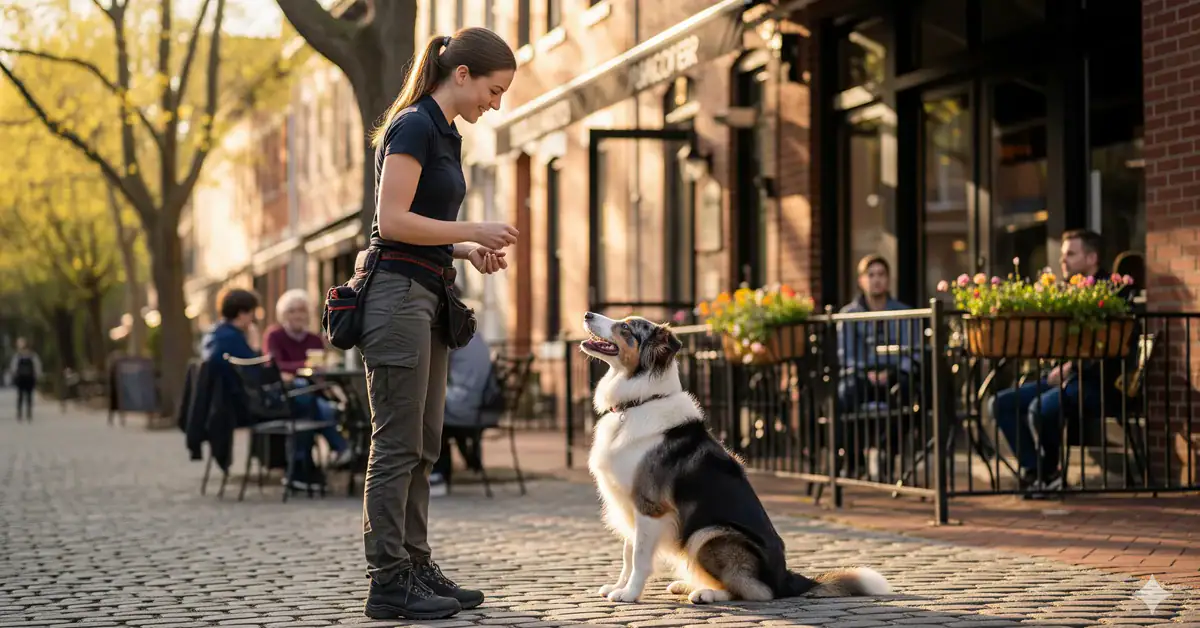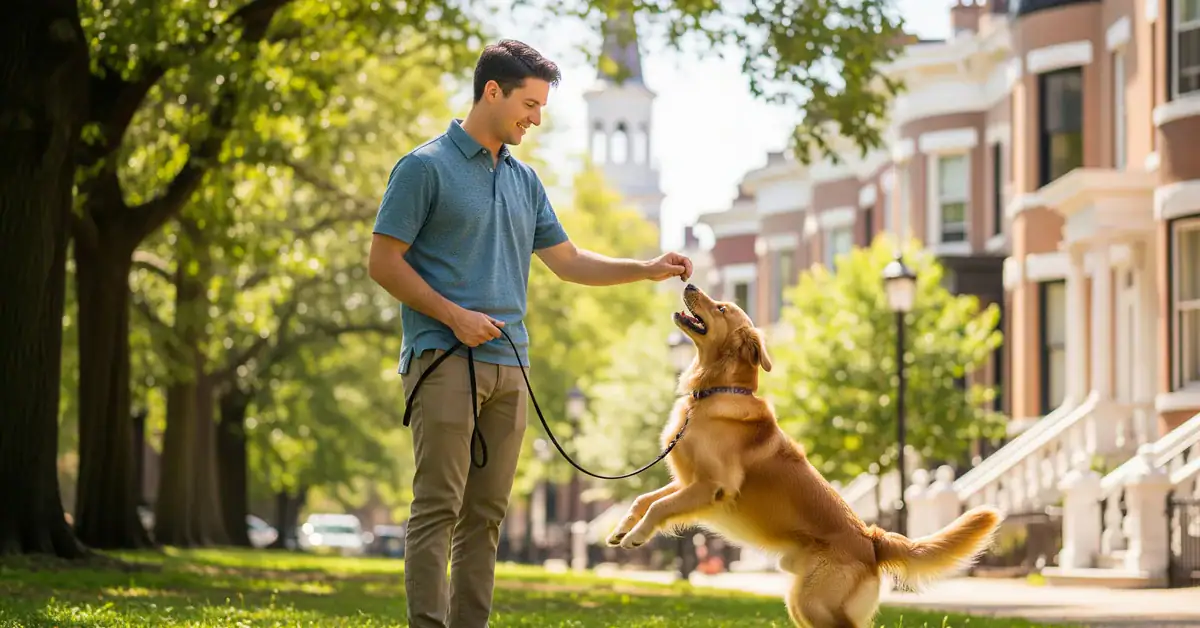Your Complete Guide to Choosing a Dog Trainer in Baltimore
Navigating the world of dog training can feel overwhelming, especially when you’re looking for local options. For dog owners, finding the right support means understanding both general training principles and specific local considerations. This guide aims to help you make informed decisions when seeking dog training in Baltimore, MD.
Whether you have a new puppy needing basic obedience or an adult dog with behavioral issues, a professional dog trainer can provide valuable assistance. Finding dog trainers who align with your goals and your dog’s needs is key to a successful experience.
How to Choose the Right Trainer
Selecting a dog trainer for your canine companion requires careful consideration. Start by defining your training needs, whether it’s puppy training, addressing specific behavioral issues, or advanced obedience training.
A good trainer will help you assess your dog’s temperament and tailor a training plan.
Look for trainers who emphasize positive reinforcement methods, which build a strong bond between you and your pup. Consider their experience with your dog breed or similar behavioral challenges. Reputation and communication style are also important factors when choosing a professional dog trainer.
Common Dog Training Methods Explained

Understanding various dog training methods can help you choose the best fit for your family and canine companion. Many dog trainers utilize different approaches to achieve desired behaviors.
- Positive Reinforcement: This widely recommended method focuses on rewarding desired behaviors, such as treats, praise, or toys. It encourages dogs to repeat actions by making the experience enjoyable and builds a strong, trusting relationship. Most basic obedience and puppy training programs utilize positive reinforcement.
- Balanced Training: This approach incorporates both positive reinforcement and mild corrections or aversives for undesired behaviors. Trainers using this method aim to find a balance between rewarding good behavior and discouraging unwanted actions.
- Clicker Training: A subset of positive reinforcement, clicker training uses a small device to make a distinct sound, marking the exact moment a dog performs a desired action. This clear communication helps the dog understand precisely what behavior earned the reward.
- Force-Free Training: This method strictly avoids any aversive tools or techniques, focusing entirely on positive reinforcement. It aims to create a stress-free learning environment for the dog.
Discuss the training methods with any potential trainer to ensure they align with your comfort level and training philosophy.
Average Cost of Dog Training in Baltimore (Updated for 2025)
The cost of dog training can vary significantly based on the type of service, trainer experience, and program length. Understanding these ranges helps you budget for your dog training program.
Generally, group classes are the most affordable option, while personalized private lessons or intensive board and train programs are more expensive.
Keep in mind that these are average ranges, and specific pricing will depend on the individual dog training company.
| Training Type | Average Cost Range (Baltimore Area) | Description |
|---|---|---|
| Group Classes | $150 – $350 per course | Typically 4-8 weekly sessions focusing on basic obedience commands and socialization. Ideal for puppies and new dog owners. |
| Private Lessons | $100 – $250 per session | One-on-one personalized training tailored to specific needs, often in your home or at a trainer’s facility. Good for targeted behavior modification. |
| Board & Train Programs | $1,500 – $4,500+ per 2-4 weeks | Your dog lives with the trainer for an intensive training period. Excellent for serious behavioral issues or busy owners, but typically the highest investment. |
| Specialized Workshops | $50 – $150 per workshop | Short, focused sessions on specific topics like leash manners, recall, or puppy socialization. |
Factors influencing cost include the trainer’s certifications (like CPDT-KA), their years of experience, and whether they offer in-home training versus facility-based sessions. Always get a clear quote and understanding of what’s included.
Local Considerations for Dog Owners
Baltimore City has a strict leash law. All dogs are required to be on a leash and under the control of their owner when off their private property. This applies to sidewalks, parks, and other public areas. This rule is enforced by Baltimore City Health - Animal Services to prevent incidents and ensure public safety.
Noise ordinances are also in place, meaning excessive barking can lead to complaints from neighbors. While some barking is natural, continuous barking that disturbs the peace can result in official warnings. Here’s the process for submitting barking dog complaints.
Maryland does not have specific state or county-level licensing requirements for dog trainers. However, most professional dog training companies operate as legitimate businesses and often obtain standard business licenses from the city or state.
Reputable trainers typically carry professional liability insurance to protect themselves and their clients. While not legally mandated for dog trainers, it is a sign of professionalism and a commitment to safety.
Always ask a trainer about their insurance coverage and any professional certifications they may hold.
Questions to Ask a Potential Dog Trainer
Before committing to a dog training program, asking a few key questions can help you gauge a trainer’s suitability. These questions will help you find the best fit for your dog.
- What are your training methods, and why do you use them?
- What experience do you have with my dog’s breed or specific behavioral issues?
- Can you provide references from past clients?
- What are your qualifications or certifications?
- How long does a typical training program last, and what does it include?
- What is your policy on make-up sessions or follow-up support?
- Are you insured, and can you provide proof of insurance?
- How do you handle difficult or aggressive behaviors?
- What is your philosophy on puppy socialization?
- Can I observe a training session before enrolling my dog?

Local Resources for Dog Owners
Baltimore offers various resources that can enhance your dog’s well-being and provide opportunities for socialization beyond formal dog training classes. Exploring these local spots can complement your training efforts and help reinforce good behavior in different environments.
Dog Parks:
Baltimore is home to several dedicated dog parks where your canine can play off-leash in a safe, enclosed environment.
Remember, even in dog parks, always supervise your dog and ensure they respond to basic commands before letting them off-leash.
- Patterson Park Dog Park: Located within the historic Patterson Park, this dog park offers separate off-leash areas for large and small dogs. It’s a popular spot for dog owners and provides a great space for canine socialization in a vibrant neighborhood setting.
- Canton Dog Park: Situated near the waterfront, the Canton Dog Park is another well-maintained area for dogs to exercise and interact. It’s a favorite among local residents in the Canton and Fells Point areas.
- Locust Point Dog Park / Latrobe Park Dog Park: Found within Latrobe Park, this dog park provides stunning harbor views. It’s a convenient option for those in the Locust Point and Federal Hill neighborhoods, offering a spacious area for dogs to run.
Other Dog-Friendly Locations:
Many parts of Baltimore are dog-friendly, offering excellent opportunities for walks and outdoor activities. Consider visiting scenic trails in areas like Druid Hill Park or parts of the Gwynns Falls Leakin Park for on-leash adventures with your pup.
Many outdoor cafes and breweries in neighborhoods like Hampden, Fells Point, and Federal Hill welcome well-behaved dogs on their patios.
Local Pet Resources:
Organizations like BARCS (Baltimore Animal Rescue and Care Shelter) are vital resources for pet adoption and lost animal services.
The Baltimore Humane Society also offers similar support, along with educational programs for responsible pet ownership.

FAQs
Are there specific leash laws in Baltimore City?
Yes, Baltimore City has a strict leash law. All dogs must be on a leash and under the direct control of their owner whenever they are off private property, including sidewalks, streets, and parks. This applies to all dog breeds and temperaments.
Do dog trainers in Baltimore need to be licensed or certified by the state?
No, there are no specific state or city government licensing requirements for dog trainers in Baltimore. However, many professional dog trainers choose to obtain voluntary certifications from recognized organizations, which demonstrates their expertise and commitment to ethical practices.
What should I do if my dog barks excessively in my home?
Excessive barking can be addressed through dog training focused on behavior modification. Baltimore City has noise ordinances regarding barking, so addressing this issue promptly is wise. A professional dog trainer can help identify the cause of the barking and implement a plan using positive reinforcement techniques.
Are there local resources for adopted dogs in Baltimore?
Organizations like BARCS and the Baltimore Humane Society offer support, and many local rescue groups can provide advice and community for new pet parents. Many trainers offer specialized programs for rescue dogs.
Can I train my dog in Baltimore’s public parks?
You can certainly practice dog training in public parks, but always ensure your dog remains on a leash as per city law. Many parks offer open spaces suitable for practicing commands like “sit” or “stay,” and are great for socialization. However, off-leash play is strictly reserved for designated dog parks.
